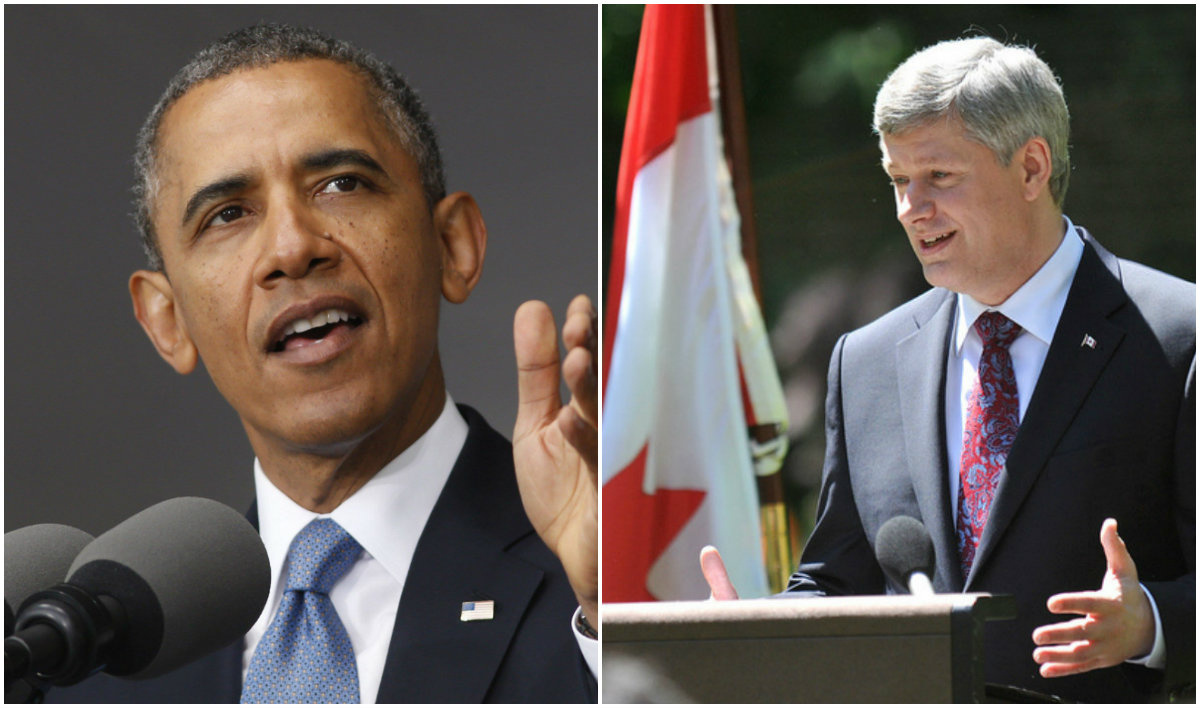ATLANTA — There was plenty of chatter at international free-trade talks about the election that could kill the new Trans-Pacific Partnership deal.
No, not Canada's.
From the protesters outside, to the lobbyists indoors, the gaze at this convention site was cast a little farther ahead to the 2016 United States election.
Political forces from the left and right are squeezing in on those fateful few swing votes in the U.S. Congress. In the Senate, about 10 votes separate the deal from failure.
In a few months, those members could decide whether TPP becomes the biggest trade zone in history, or a soon-forgotten, self-congratulatory press release.
A little blue car parked outside the convention site hinted at the opposition ahead.
It was covered in presidential campaign signs for Bernie Sanders, who's doing the squeezing from the left. A passenger held up a printed cutout of the surprisingly competitive socialist senator who's upended the Democratic race, pushing Hillary Clinton to take a stand against the Keystone pipeline, and is now urging her to oppose TPP.
"TPP will have a very difficult road ahead," said Melinda St. Louis, who helped organize a sidewalk protest when the Sanders-mobile pulled up to the curb and joined in.
Nearby, cancer patient Zahara Heckscher held up an IV bag and said longer patent-type protections could make the cutting-edge medicines she uses unaffordable in poorer countries.
St. Louis said there's already talk of primaries to oust congressional Democrats who supported the recent fast-track vote to facilitate trade deals, and they're nervous: "None of them want to take . . . a difficult vote (next year)."
Inside the hotel, pressure mounted from the other side.
The chamber-of-commerce types fretted about Republicans. A letter floated around, signed by GOP establishment figures who urged a pause in the talks. They feared American pharmaceutical companies wouldn't get a good-enough deal.
Orrin Hatch and Paul Ryan demanded 12 years of patent-style protection on hyper-expensive, cell-based biologics. Negotiators settled at a compromise between five and eight. Hatch, who received about $834,000 in campaign donations from the pharmaceutical-and-health industry in the last election cycle, later issued a statement: "I am afraid this deal appears to fall woefully short."
And then there's the candidate who defies political categorization.
Donald Trump isn't heavily funded by industry; he's hated by the establishment; he's certainly not left-wing. But he's the Republican front-runner. And he apparently hates this deal as much as other ones. He tweeted Monday: "The incompetence of our current administration is beyond comprehension. TPP is a terrible deal."
A trade expert who helped start the TPP process is watching closely. Timothy Keeler was chief of staff at the White House agency, USTR, that opened the initial discussions with original TPP countries in late 2008.
He expects it to pass. But he's no longer so sure.
"If you'd asked me six months ago, I'd have said it's very likely," said Keeler, a partner at Mayer Brown.
"I think with the rise of Donald Trump, and Bernie Sanders, and the resignation of Speaker John Boehner, that's certainly lowered the chances. I still think this Congress will approve it . . . I can see it happening eight, nine months from now. And I can see it happening in a lame-duck session (after the presidential election)."
What are the telltale signs — the swing votes to watch and see where TPP's headed?
Keeler offers two answers.
There's the simple one: "Let's see how long Donald Trump stays in the lead — that's something to keep an eye on."
Then there's the more detailed picture.
He said the Obama administration needs to persuade key members — Democrats Ron Johnson of Wisconsin and Ron Wyden of Oregon. Republicans to watch, he said, are Hatch, Ryan and Senate leader Mitch McConnell who represents tobacco-growing Kentucky.
Tobacco got smoked in the deal.
Having been sued over cigarette-packages, Australia forced the U.S. to exempt tobacco from the right of companies to challenge laws in special courts.
In the other chamber, McConnell's counterpart is quitting. It was actually a dispute over trade that started the domino-effect that toppled John Boehner from the leadership.
The chamber leader stripped members of caucus positions after they voted against him on trade fast-track. They joined a rebellion, and forced Boehner out.
A Canadian opponent of the deal says the U.S. will be key. Martin O'Hanlon was there at the Atlanta protest, as the head of a union involved in the fight.
"The biggest fight in the world right now with regard to TPP is in Washington," said O'Hanlon, a former editor for The Canadian Press who's left to head the national branch of Communication Workers of America.
"You've got all these things coming together. It could be a perfect storm for Obama and the TPP."
He predicted it would stall in Congress. And without approval in all 12 countries, the deal dies.
Alexander Panetta, The Canadian Press



Comments